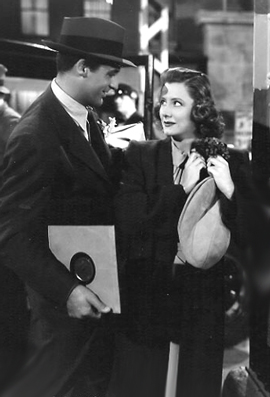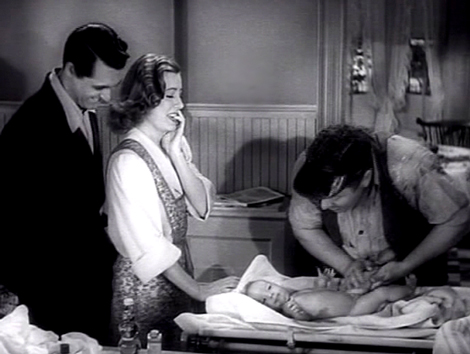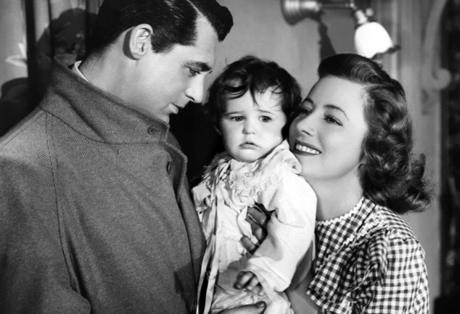|
|
Reviewed by Glenn Erickson
Penny Serenade from 1941 is one of director George Stevens' most accomplished pictures. It's an unusually penetrating chronicle of a Depression-era marriage, from a happenstance first meeting to rough times trying to establish a family. Although best known at the time for comedies, musicals and light adventures, Stevens and his writer Morrie Ryskind (My Man Godfrey) had something different in mind for their stars Irene Dunne and Cary Grant -- a bittersweet look at the kind of domestic problems often glossed over in Hollywood pictures.
Always a hit in lighter fare, star Cary Grant wasn't as consistently successful in straight roles. Teamed here with the multi-talented Irene Dunne, Grant plays in a much more vulnerable key, and gives what is possibly his best dramatic performance. The film earned him his first Oscar nomination.

The movie is structured as a series of flashback episodes, each cued by the music from records that Julie Gardiner (Irene Dunne) plays as she prepares to leave her husband, journalist Roger Adams (Cary Grant). Their story begins ten years before when Roger sees Julie working in a music store. They are soon an item, with Julie concerned that the charming Roger isn't taking the relationship seriously. He suddenly announces that in just three hours he will be leaving for a job in Japan: will she marry him right away? The initial months of excitement are soon tempered, first by money issues and then by a personal tragedy when they're caught up in the great Tokyo earthquake of 1933. Back in California, the couple struggles to make a go of a tiny newspaper, The Courier. But their troubles seem to be just starting. Repeatedly frustrated in their dream of adding a baby to the family, Roger and Julie begin to feel that their marriage is doomed.
Sentimental domestic dramas like Penny Serenade work when audiences can identify with the problems of the leading characters. The silent classics The Crowd and Lonesome place their lovers in the lower working class, but audiences often preferred to see beautiful stars leading glamorous lives. But movies about disadvantaged people struggling in the Depression could be just as problematical as airy fantasies about the idle rich. In Torch Singer penniless single mother Claudette Colbert must give her baby up for adoption, and when she becomes a wealthy entertainer, goes to great lengths to get her back. The feelings of the adoptive parents aren't taken into account. More than one movie concocted a third act conflict by putting a baby's health in jeopardy. David O. Selznick's shameless Weepie Made for Each Other drums up tension by showing a crucial baby-saving serum being flown in through a blizzard, while James Stewart and Carole Lombard blubber in big close-up.
Penny Serenade steers a middle course, and doesn't magnify its emotions beyond all proportion. Julie Gardiner's romantic dream begins with an amorous send-off on a train and continues through a sojourn in Japan -- a rather fanciful one, considering the unlikely detail of Julie dressing in a formal Japanese kimono. Before one can say Frank Lloyd Wright, the entire wooden city collapses onto the couple. The earthquake ends on a very unsubtle note, when a falling beam obliterates Julie's old fortune cookie keepsake ("You will have a baby").
Penny Serenade is realistic about life's unexpected turns, which can indeed be as dramatic as an earthquake. The screenplay is also honest about marriage when it establishes that Roger and Julie have joined themselves together without really knowing each other very well. The pragmatic Julie disapproves of Roger's carefree talk about trips around the world, to be paid for by an inheritance that seems to shrink to nothing even as he describes it. We can tell that something is missing in Julie's life. After their setbacks, she and Roger develop difficulties in facing each other emotionally.
At this point enters a writer's invention even bigger than the Japanese earthquake. The endearing Applejack Carney (Edgar Buchanan) is a family friend and mechanical troubleshooter in the press room. Jack gets a busted linotype machine to work, fixes the plumbing, and provides substantial marriage counseling. He intervenes so far as to introduce the notion of adoption. When they finally get their baby, Roger and Julie are so afraid of hurting it that Applejack must step in to give the kid its first bath at home. Stevens films this in one very long take, and it's delightful. Viewers with children nod in approval of Edgar Buchanan's baby-wrangling skill; those without experience realize that they'd be intimidated too. A middle-aged man demonstrating his expertise in a baby's nursery? American films seldom depicted ordinary life of this kind, which may be an unintended side effect of a Production Code that discouraged realistic portrayals of many basic human functions, even pregnancy.

The Applejack character relieves the movie of the need for additional characters. No visible relatives or friends appear to give advice or guidance to Julie and Roger. Applejack ably serves both functions. I always thought it was interesting that Edgar Buchanan's haircut as Applejack makes him look very much like director Stevens...
Worry, trouble and tragedy keep hitting the Adams family. The frequent flashback interruptions to a morose, defeated Julie playing another record remind us that more bad news is on the way. The only other major character in the film is Miss Oliver (Beulah Bondi), an adoption agent. Miss Oliver talks a pessimistic line but bends the rules to help Julie and Roger. When a child is finally part of the story, our feelings are divided between delight -- Julie and Roger seem so happy to have a baby of their own -- and dread that something will happen to it. For its entire second half Penny Serenade risks going too far with its tragedies. Yet it remains bearable even when the worst happens. Too proud to face their feelings of guilt and failure, the parents drift into separate melancholy states. None of this insight is overstated. Penny Serenade transcends the Weepie subgenre.
Only briefly do Ryskind and Stevens play cruel games. To animate a star for her school Christmas pageant, the Adams's tiny daughter climbs a catwalk on stage. For a few uncomfortable minutes we fear that she'll fall and break her neck. Mercifully, the story's worst news is delivered softly, after the fact: we find out what happened as someone in 1940 might, through a letter written in longhand. The flashbacks are selective slices of Julie's memory. 1
Irene Dunne is once again her utterly charming and captivating self. She strikes a different note when Roger tells Julie that he doesn't want to adopt a baby girl. Julie has bonded with the infant from the moment she picked her up. She shoots Roger a flash of concentrated maternal fury that says he'd better not try to separate them, if he values his life. It's a tiny but tellingly true moment.
Second-billed Cary Grant has a few privileged moments of his own. Grant probably gives the best straight scene of his career when Roger pleads his case before a judge, begging for his baby not to be taken away. Stevens wisely plays the scene in medium shot, leaving Roger alone and defenseless in the middle of the room, his voice cracking. Neither does Stevens insert slobbering emotional close-ups of Julie or Miss Oliver, to tell us how to react. We're never certain that "all will be okay."
The most successful bittersweet tearjerkers exercised restraint, and director Stevens tastefully avoids abusing the emotions of his audience. His partly improvised scenes add freshness and a human dimension, especially when events unspool in real time as in the baby bath scene. This technique prompts comparisons with director Leo McCarey, who was noted for making on-the-set inspirations an important part of the filmmaking process. Both directors' output was variable, of course. Compared to Stevens' earlier Vigil in the Night, a rigid book adaptation that rings almost totally false, Penny Serenade is a fresh approach. George Stevens' winning quality during these years may have been his essential humility. He seems to have personally been very much in touch with life as led by ordinary people.

Penny Serenade seems to have made a big impact on Frank Capra's It's a Wonderful Life. Jimmy Stewart's empowered grandstanding in that movie are made from a position of moral strength, whereas Cary Grant's 'don't take my baby' speech in Penny Serenade is the honest plea of a defeated man. Unlike Stewart, Grant isn't outraged and isn't lecturing to people less enlightened than himself. The less manipulative Stevens is more trustful of both the material and his audience. At one point Grant struggles with a stuck door, reminding us of Stewart's loose banister knob in the Bailey house. Most tellingly, Capra borrows and extends an emotional telephone scene idea from Penny Serenade. When Miss Oliver calls with more adoption news, Roger and Julie must stand close together to hear her tiny voice on the phone receiver.
American movies from the pre-war decade often communicate a different attitude toward life than the one promoted in our modern consumer culture. Roger and Julie haven't the luxury of making casual "lifestyle choices", and instead struggle with life problems that don't offer a choice. Penny Serenade reminds us that life has no guarantees, and that something as precious as a child should never be taken for granted. The movie may be a 'Weepie', but it communicates some of the joy of life amid its painful problems and cruel accidents.
Olive Film's Blu-ray of Penny Serenade is yet another welcome surprise. The title has long existed in Public Domain eyesore versions, with splices, degraded video and scratchy sound. A few tiny scratches aside, this copy is in perfect condition. We can even appreciate the careful iris wipes that begin and end the flashback episodes -- in a couple of cases the incoming scene is a freeze-frame. The 1941 titles credit ownership to Columbia Pictures, which either goofed in not renewing the copyright, or was prevented from doing so by a legal Catch-22.
Olive provides no extras and no subtitles, but we still marvel at the cinematic riches they have licensed from Paramount -- odds and ends that include dozens of abandoned, orphaned or shelved classics. This will be a welcome release indeed for collectors.
Olive just announced a long list of upcoming titles through another website -- coming in the next year or so will be more Betty Boop Cartoon Collections, The Pawnbroker, The Bells of St. Mary, Stranger on the Prowl, Sleep My Love, Mr. Peabody and the Mermaid, That's My Man, I've Always Loved You, Magnificent Doll, Forever Female, Up the Junction, Home of the Brave, Johnny Come Lately, Flying Tigers, The North Star / Armored Attack, Operation Petticoat, Distant Drums, Good Sam, High School Confidential, Love Happy, Sands of Iwo Jima, South of St. Louis, Try and Get Me (aka The Sound of Fury), So This is New York, Arch of Triumph, Caught, The Lost Moment, Men in War, The Other Love, Cauldron of Blood, Beware, My Lovely, Outrage, Dr. Terror's House of Horrors, Man on the Roof, The Adalen Riots, Elvira Madigan, Raven's End, Fedora, The Stationmaster's Wife (Uncut Version), Dead Pigeon on Beethoven Street (uncut never-before-seen version), J'Accuse (1938), Ophelia (Chabrol), The World's Most Beautiful Swindlers, Guilty of Romance, Himizu.
On a scale of Excellent, Good, Fair, and Poor,
Penny Serenade Blu-ray rates:
Movie: Excellent
Video: Excellent
Sound: Excellent
Audio: English
Supplements:
Deaf and Hearing Impaired Friendly?
No; Subtitles: None
Packaging: Keep case
Reviewed: August 29, 2013
Republished by permission of Turner Classic Movies.
Footnote:
1. Lynne Littman's apocalyptic tragedy Testament makes use of a similar kids-as-angels motif at a Christmas pageant, and is just as creepy. It too knows the power of restraint.
A Penny Serenade scene that will make modern viewers uneasy is when Julie brings her newborn baby to bed with her in the middle of the night -- important PSA propaganda warns us that many children are smothered this way, every year. Roger doesn't even know there's a tiny baby next to him -- what if he rolled over?
Incidentally, Julie and Roger appear to sleep together in the same bed, a flagrant defiance of the Production Code. For that matter, early in the picture it looks as if the couple shares an unplanned, torrid sex encounter on a train. Some hot stuff is going on through that partially closed compartment door. We all agree that high morals are important, so think carefully before you decide to watch the questionable Penny Serenade.
Return

DVD Savant Text © Copyright 2013 Glenn Erickson
See more exclusive reviews on the Savant Main Page.
Reviews on the Savant main site have additional credits information and are often updated and annotated with footnotes, reader input and graphics.
Return to Top of Page
|


